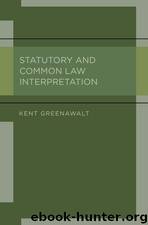Statutory and Common Law Interpretation by Kent Greenawalt

Author:Kent Greenawalt
Language: eng
Format: epub
Published: 2014-12-12T16:00:00+00:00
C. National Scope, Rule Creation, Political Responsibilities, and the Authority to Implement: Four Factors Bearing on Appropriate Agency Interpretation
Apart from comparative competence in gauging the implications and force of various factors that could affect interpretation, the position of agencies, as compared with courts, can affect desirable interpretation.
The most straightforward factor is the scope of agency jurisdiction. A national agency can set rules for the entire nation, a state agency for the entire state. The Supreme Court also makes determinations that apply for the whole country; and Courts of Appeals for the District of Columbia Circuit and for the Federal Circuit are exclusive venues for limited subjects, (p.152) as are some specialized tribunals such as the Court of Claims. But when most federal courts interpret statutes, they lack an assurance that other courts with comparable jurisdiction will decide similarly. Since the Supreme Court is able to take only a highly limited number of cases per year, the possibility of enduring conflicts over correct interpretations is created.34 As we have seen, this possibility underlies a claim that courts should rely on simple criteria of interpretation, ones whose implications will be perceived similarly by judges of varying persuasions. One argument against heavy judicial reliance on legislative history is that different judges are likely to disagree about what it shows, thus enhancing the possibility of conflicting interpretations. If only one agency is involved and its use of legislative history otherwise makes good sense, it need not worry about coordination, since it can lay down one set of rules that applies nationally.
A second factor that may influence at least some agency interpretation is the desirability of announcing rules that are relatively precise and convenient to administer.35 This consideration also influences some judicial decisions, but in general, judges may feel relatively comfortable both about themselves using vague or open-ended standards to evaluate behavior that has already occurred and about announcing such standards for juries to employ. A typical example is the standard of negligence, which requires evaluation of whether behavior that caused harm was reasonable or unreasonable. An agency will typically aim for guidelines that are much more specific about what may and may not be done.
A much more complex array of considerations is presented by the political status of agencies. Agencies are not independent in the manner of courts. Most federal agencies in the United States are part of the executive branch, with higher level officials who may be appointed because they subscribe to the views of the president and who may be dismissed by him if he is dissatisfied with their performance. Independent agencies are somewhat less under the president’s control and their officials cannot be dismissed without good cause; but even these agencies are susceptible in various ways to presidential influence, including appointment of the agency’s chair.36 Agencies also have close connections with the relevant committees of Congress, and their effective functioning is dependent on congressional appropriations. Part of an agency’s responsibility is to respond to changes in circumstances and policies. Jerry Mashaw
Download
This site does not store any files on its server. We only index and link to content provided by other sites. Please contact the content providers to delete copyright contents if any and email us, we'll remove relevant links or contents immediately.
American Kingpin by Nick Bilton(3887)
Future Crimes by Marc Goodman(3600)
The Meaning of the Library by unknow(2571)
Inside the Middle East by Avi Melamed(2357)
Why Nations Fail: The Origins of Power, Prosperity, and Poverty by Daron Acemoglu & James Robinson(2297)
On Tyranny by Timothy Snyder(2232)
Living Silence in Burma by Christina Fink(2071)
Putin's Labyrinth(2022)
The Mastermind by Evan Ratliff(1938)
The Smartest Kids in the World by Amanda Ripley(1856)
Think Like a Rocket Scientist by Ozan Varol(1821)
Law: A Very Short Introduction by Raymond Wacks(1748)
It's Our Turn to Eat by Michela Wrong(1731)
The Rule of Law by Bingham Tom(1698)
Philosophy of law a very short introduction by Raymond Wacks(1670)
Leadership by Doris Kearns Goodwin(1638)
A Dirty War by Anna Politkovskaya(1631)
Information and Communications Security by Jianying Zhou & Xiapu Luo & Qingni Shen & Zhen Xu(1621)
Civil Procedure (Aspen Casebooks) by Stephen C. Yeazell(1556)
